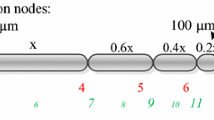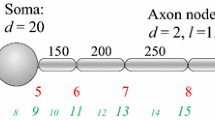Abstract
The Meddis computational model of auditory nerve fibre activity [9, 10] is widely used as a research tool in the study of auditory processing. The model is governed by a set of control parameters that allows it to simulate responses derived from physiological observations. In this paper, we describe a novel method for automatically determining the parameters required to simulate a range of rate-intensity responses from auditory nerve fibres using this model. A genetic algorithm [4] is employed to explore possible parameter combinations and to determine a ‘best fit’ solution. Two sets of experiments used to demonstrate the flexibility of the technique are described. Some possible wider applications of the technique are discussed.
Access this chapter
Tax calculation will be finalised at checkout
Purchases are for personal use only
Preview
Unable to display preview. Download preview PDF.
Similar content being viewed by others
References
K. A. De Jong. An analysis of the Behaviour of a class of Genetic Adaptive Systems. PhD thesis, University of Michigan, 1975.
E. F. Evans. Cochlear nerve and cochlear nucleus. In W.D. Keidel and W.D. Neff, editors, Handbook of Sensory Physiology. Springer-Verlag, New York, 1987.
J. M. Fitzpatrick, J. J. Grefenstette, and D. Van Gucht. Image restriction by genetic search. In Proc. of IEEE Southest Conf., pages 460–464, 1984.
D. E. Goldberg. Genetic Algorithms in Search, Optimisation and Machine Learning. Addison-Wesley, Reading, MA, 1989.
M. J. Hewitt, R. Meddis, and T. Shackleton. A computer model of a cochlear-nucleus stellate cell: Responses to amplitude-modulated and pure-tone stimuli. Acoust. Soc. Am., 91:2096–2109, 1992.
J. H. Holland. Adaption in Natural and Artificial System. University Press, Michigan, 1975.
D. O. Kim, S. Goshal, S. L. Khant, and K. Parham. A computational model with ionic conductances for the fusiform cell of the dorsal cochlear nucleus. Acoust. Soc. Am., 96:1501–1514, 1994.
P. K. Kuhl and J. D. Miller. Speech perception by the chinchilla: Identification functions for synthetic VOT stimuli. J. Acoust. Soc. Am, 63:905–917, 1978.
R. Meddis. Simulation of mechanical to neural transduction in the auditory receptor. Acoust. Soc. Am., 79:702–711, 1986.
R. Meddis. Simulation of auditory-neural transduction: Further studies. Acoust. Soc. Am., 83:1056–1063, 1988.
J. K. Moore. The human auditory brain stem: A comparative view. Hear Res., 29:1–32, 1987.
M. J. Pont and R. I. Damper. A computational model of afferent neural processing from the cochlea to dorsal acoustic stria. J. Acoust. Soc. Am., 89:1213–1228, 1991.
M. J. Pont and R. I. Damper. Exploring the role of the Dorsal Cochlear Nucleus in the Perception of Voice-Onset Time, volume 2. JAI Press, London, 1992.
M.J. Pont. The Role of the Dorsal Cochlear Nucleus in the Perception of Voicing Contrasts in Initial English stop consonants: A Computational Modelling Study. PhD thesis, Department of Electronics and Computer Science, 1990.
L. A. Westerman and R. L. Smith. Rapid and short-termadaptation in auditory responses. Hear. Res., 15:249–260, 1984.
I. A. Winter and A. R. Palmer. Intensity coding in low-frequency auditory-nerve fibres of the guinea pig. Acoust. Soc. Am., 90:1958–1967, 1991.
C. P. Wong and M. J. Pont. Automatic selection of parameters for a computer simulation of extracellular auditory nerve fibre activity. In Proceedings of the ESCA Workshop on the Auditory Basis of Speech Perception, pages 61–64, Keele, UK, 1996.
Author information
Authors and Affiliations
Rights and permissions
Copyright information
© 1998 Springer-Verlag Wien
About this paper
Cite this paper
Wong, C.P., Pont, M.J. (1998). Automated Parameter Selection for a Computer Simulation of Auditory Nerve Fibre Activity using Genetic Algorithms. In: Artificial Neural Nets and Genetic Algorithms. Springer, Vienna. https://doi.org/10.1007/978-3-7091-6492-1_21
Download citation
DOI: https://doi.org/10.1007/978-3-7091-6492-1_21
Publisher Name: Springer, Vienna
Print ISBN: 978-3-211-83087-1
Online ISBN: 978-3-7091-6492-1
eBook Packages: Springer Book Archive




